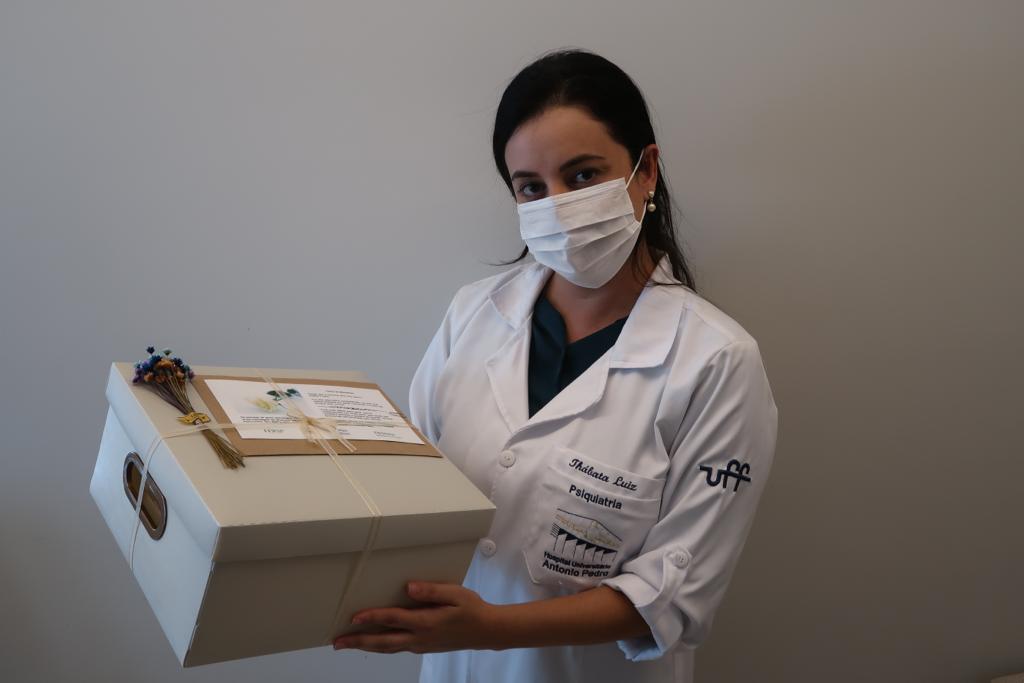Covid-19 has already taken many people’s lives. Thinking about the pain of family members, the Humanization Action to Confront Pandemic at the Antonio Pedro University Hospital created a project to make the delivery of the belongings of patients who died of the disease a little more affective and humanized. Starting this week, relatives will receive the Caixa de Memórias (Memories Box), accompanied by flowers and a card with a message of support and contacts for psychological help in this very difficult time.
“Caixa de Memórias emerged with the aim of transforming the experience of family members of taking the ‘contaminated’ belongings of patients who died into something more affectionate and caring. Good memories will remain forever, death does not end this bond. This is a way to help you start to elaborate on your grief, a process so unique to each one. Thus, we also intend to mitigate the impact on people’s mental health due to the pandemic,” explains Thábata Luiz, a psychiatrist at the hospital and one of the creators.
Before, family members took their belongings in a bag, which was kept for three days in quarantine, due to the risk of contamination. Now, the delivery is made in a box, reminding the relative that the patient’s life was shared, and he was present in several moments of it. It is important not to be reduced to the moment of death, but to think about the whole history and biography. The boxes are made by Thábata and the psychologists Tânia Ventura and Virgínia Dresch. The project has the collaboration of ACHUAP (Association of Collaborators of Hospital Universitário Antônio Pedro).
The idea came after the psychiatrist heard from the head of the Covid-19 Intensive Care Unity, Túlio Possati de Souza, that he was very moved after the death of a patient when his belongings were handed over to the family in a plastic bag. Now, with the Caixa de Memórias, the act is more affectionate. Remembering that the box will not be contaminated, as it does not enter the ICU, nor does it have contact with patients infected with the coronavirus. For Túlio, the pandemic directly interferes in the doctor-patient relationship, making humanized action even more important:
“The Covid-19 pandemic is challenging in several ways. The moment of delivery of the belongings of patients who evolve to death has been tense and difficult. The objects were delivered in bags and family members were instructed to respect a specific quarantine time (three days) at home, before having access to the content. The Caixa de Memórias initiative helps to re-signify this moment that has been so complicated not only for family members but also for professionals (and the health system).”
Virtual visits to patients at the ICU will also begin this week at Huap
Another project that also left the blueprint and will start to be applied this week is the virtual visit to patients at the ICU with coronavirus. The idea is that, through a tablet, they can get in contact with family members, since the Covid-19 environment is highly contaminated, making physical presence unfeasible. According to Thábata, the objective is to minimize additional stressors, such as family leave and the impossibility of leaving. Thus, it contributes to the prevention of mental disorders, such as complicated grief and post-traumatic stress:
“The average length of hospital stay for patients with coronavirus varies widely and involves isolation from them and their families. Many will be out of touch and lonely, as keeping them with their phones is not always a viable option. On the other hand, family members also experience anguish for not interacting with their loved ones. The creation of a communication flow aimed at these patients and their social support network, through virtual visits, is shown as an important resource for humanizing care and reducing suffering”.
Doctor Túlio adds that the lack of visits harms mainly elderly patients with the potential for developing delirium and confinement syndrome. In addition, eye-to-eye contact and physical proximity also facilitate the communication of difficult news and the perception of understanding what is being said. “In other words, the elaboration of virtual visits through tablets appears as a good alternative to circumvent this social isolation imposed by the disease,” emphasizes the head of ICU.
PsiCOVIDa helps Huap health professionals
Another work that has been carried out at the hospital since April is PsiCOVIDa (a Portuguese acronym of Psychology + COVID + life), welcoming Huap health professionals on the front lines fighting the pandemic and who need psychological or emotional support. Listening is offered in person or online, and, according to demand assessed by the assistant team, also to inpatients and their families. The goal is to convey to the host the message that they are not alone at this time.
“We, from mental health, are present at all times of this pandemic in order to take care of the suffering of people, both health professionals, family members, and patients who experience these painful situations. With that, we are doing these actions so that they have the best experience of dignity possible within this scenario. Psychological and psychiatric support to professionals (PsiCOVIDa), the virtual visit of patients in isolation, and Caixa de Memórias are some of these actions,” concludes the psychiatrist.




